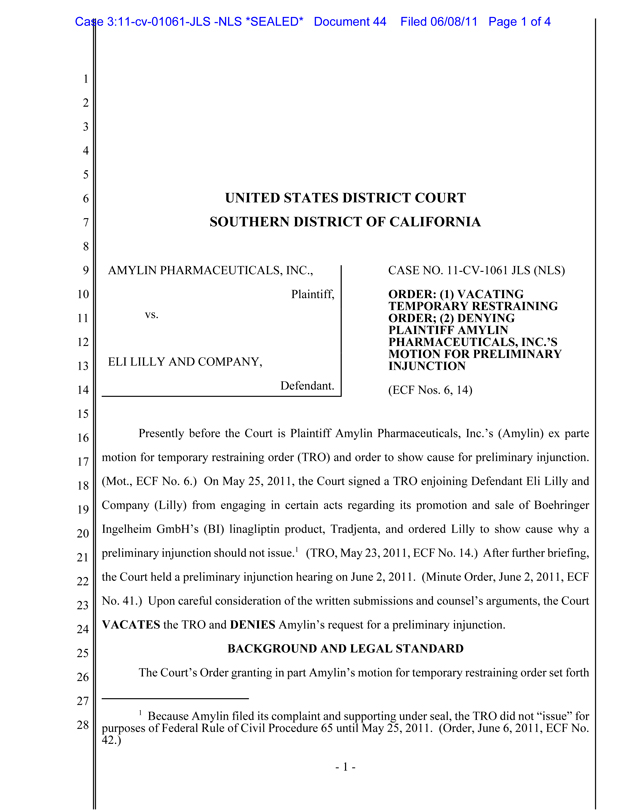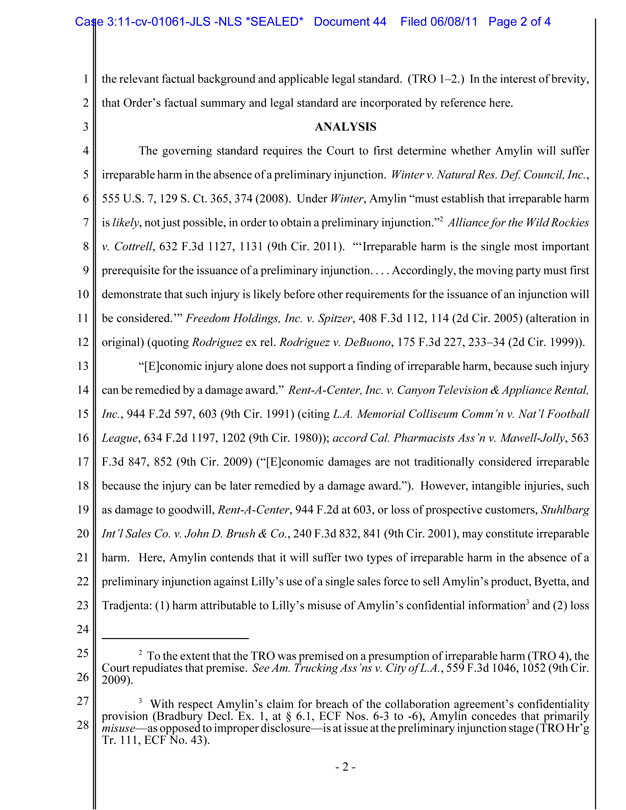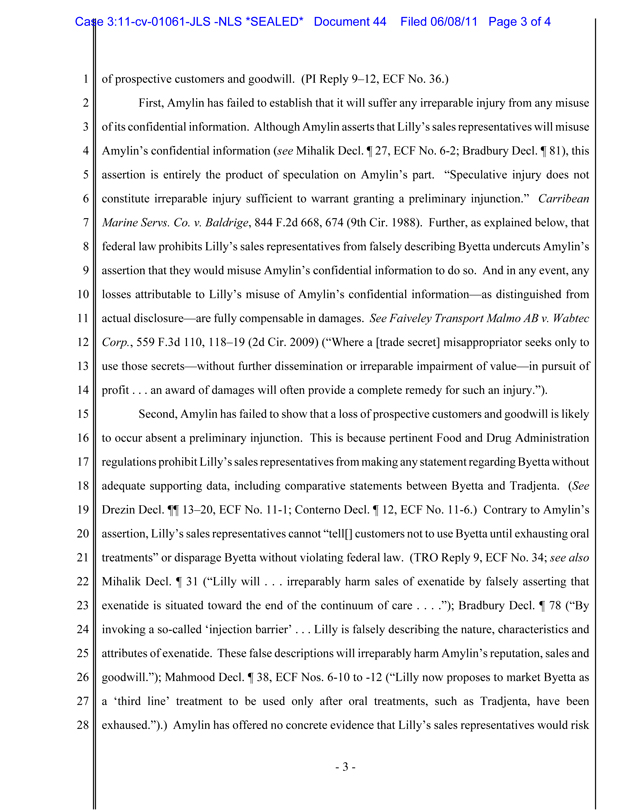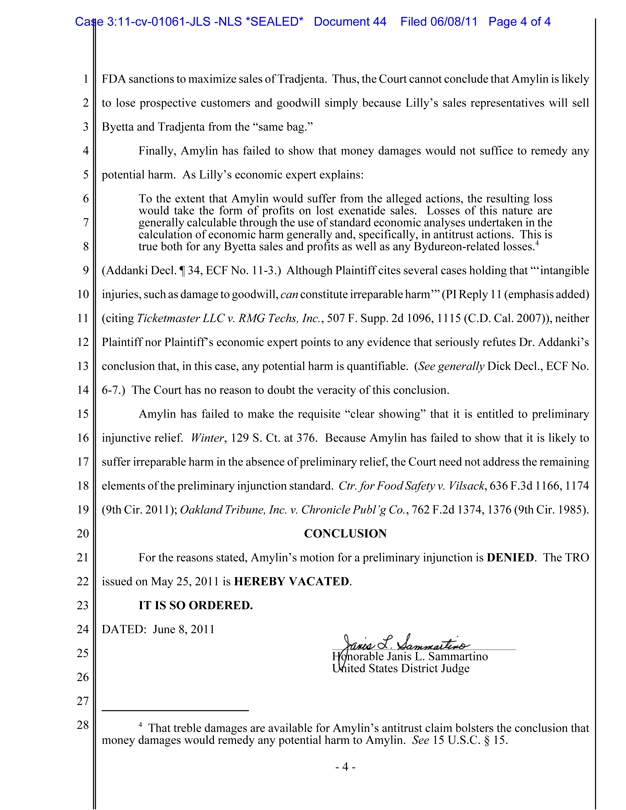Attached files
| file | filename |
|---|---|
| 8-K - FORM 8-K - AMYLIN PHARMACEUTICALS INC | d8k.htm |
Exhibit 99.1

Case 3:11-cv-01061-JLS -NLS *SEALED* Document 44 Filed 06/08/11 Page 1 of 4 1 2 3 4 5 6 UNITED STATES DISTRICT COURT 7 SOUTHERN DISTRICT OF CALIFORNIA 8 9 AMYLIN PHARMACEUTICALS, INC., CASE NO. 11-CV-1061 JLS (NLS) 10 Plaintiff, ORDER: (1) VACATING vs. TEMPORARY RESTRAINING 11 ORDER; (2) DENYING PLAINTIFF AMYLIN 12 PHARMACEUTICALS, INC.’S ELI LILLY AND COMPANY, MOTION FOR PRELIMINARY 13 INJUNCTION 14 Defendant. (ECF Nos. 6, 14) 15 16 Presently before the Court is Plaintiff Amylin Pharmaceuticals, Inc.’s (Amylin) ex parte 17 motion for temporary restraining order (TRO) and order to show cause for preliminary injunction. 18 (Mot., ECF No. 6.) On May 25, 2011, the Court signed a TRO enjoining Defendant Eli Lilly and 19 Company (Lilly) from engaging in certain acts regarding its promotion and sale of Boehringer 20 Ingelheim GmbH’s (BI) linagliptin product, Tradjenta, and ordered Lilly to show cause why a 21 preliminary injunction should not issue.1 (TRO, May 23, 2011, ECF No. 14.) After further briefing, 22 the Court held a preliminary injunction hearing on June 2, 2011. (Minute Order, June 2, 2011, ECF 23 No. 41.) Upon careful consideration of the written submissions and counsel’s arguments, the Court 24 VACATES the TRO and DENIES Amylin’s request for a preliminary injunction. 25 BACKGROUND AND LEGAL STANDARD 26 The Court’s Order granting in part Amylin’s motion for temporary restraining order set forth 27 1 Because Amylin filed its complaint and supporting under seal, the TRO did not “issue” for 28 purposes of Federal Rule of Civil Procedure 65 until May 25, 2011. (Order, June 6, 2011, ECF No. 42.) -1-

Case 3:11-cv-01061-JLS -NLS *SEALED* Document 44 Filed 06/08/11 Page 2 of 4 1 the relevant factual background and applicable legal standard. (TRO 1–2.) In the interest of brevity, 2 that Order’s factual summary and legal standard are incorporated by reference here. 3 ANALYSIS 4 The governing standard requires the Court to first determine whether Amylin will suffer 5 irreparable harm in the absence of a preliminary injunction. Winter v. Natural Res. Def. Council, Inc., 6 555 U.S. 7, 129 S. Ct. 365, 374 (2008). Under Winter, Amylin “must establish that irreparable harm 7 is likely, not just possible, in order to obtain a preliminary injunction.”2 Alliance for the Wild Rockies 8 v. Cottrell, 632 F.3d 1127, 1131 (9th Cir. 2011). “’Irreparable harm is the single most important 9 prerequisite for the issuance of a preliminary injunction. Accordingly, the moving party must first 10 demonstrate that such injury is likely before other requirements for the issuance of an injunction will 11 be considered.’” Freedom Holdings, Inc. v. Spitzer, 408 F.3d 112, 114 (2d Cir. 2005) (alteration in 12 original) (quoting Rodriguez ex rel. Rodriguez v. DeBuono, 175 F.3d 227, 233–34 (2d Cir. 1999)). 13 “[E]conomic injury alone does not support a finding of irreparable harm, because such injury 14 can be remedied by a damage award.” Rent-A-Center, Inc. v. Canyon Television & Appliance Rental, 15 Inc., 944 F.2d 597, 603 (9th Cir. 1991) (citing L.A. Memorial Colliseum Comm’n v. Nat’l Football 16 League, 634 F.2d 1197, 1202 (9th Cir. 1980)); accord Cal. Pharmacists Ass’n v. Mawell-Jolly, 563 17 F.3d 847, 852 (9th Cir. 2009) (“[E]conomic damages are not traditionally considered irreparable 18 because the injury can be later remedied by a damage award.”). However, intangible injuries, such 19 as damage to goodwill, Rent-A-Center, 944 F.2d at 603, or loss of prospective customers, Stuhlbarg 20 Int’l Sales Co. v. John D. Brush & Co., 240 F.3d 832, 841 (9th Cir. 2001), may constitute irreparable 21 harm. Here, Amylin contends that it will suffer two types of irreparable harm in the absence of a 22 preliminary injunction against Lilly’s use of a single sales force to sell Amylin’s product, Byetta, and 23 Tradjenta: (1) harm attributable to Lilly’s misuse of Amylin’s confidential information3 and (2) loss 24 25 2 To the extent that the TRO was premised on a presumption of irreparable harm (TRO 4), the Court repudiates that premise. See Am. Trucking Ass’ns v. City of L.A., 559 F.3d 1046, 1052 (9th Cir. 26 2009). 27 3 With respect Amylin’s claim for breach of the collaboration agreement’s confidentiality provision (Bradbury Decl. Ex. 1, at § 6.1, ECF Nos. 6-3 to -6), Amylin concedes that primarily 28 misuse—as opposed to improper disclosure—is at issue at the preliminary injunction stage (TRO Hr’g Tr. 111, ECF No. 43). -2-

Case 3:11-cv-01061-JLS -NLS *SEALED* Document 44 Filed 06/08/11 Page 3 of 4 1 of prospective customers and goodwill. (PI Reply 9–12, ECF No. 36.) 2 First, Amylin has failed to establish that it will suffer any irreparable injury from any misuse 3 of its confidential information. Although Amylin asserts that Lilly’s sales representatives will misuse 4 Amylin’s confidential information (see Mihalik Decl. ¶ 27, ECF No. 6-2; Bradbury Decl. ¶ 81), this 5 assertion is entirely the product of speculation on Amylin’s part. “Speculative injury does not 6 constitute irreparable injury sufficient to warrant granting a preliminary injunction.” Carribean 7 Marine Servs. Co. v. Baldrige, 844 F.2d 668, 674 (9th Cir. 1988). Further, as explained below, that 8 federal law prohibits Lilly’s sales representatives from falsely describing Byetta undercuts Amylin’s 9 assertion that they would misuse Amylin’s confidential information to do so. And in any event, any 10 losses attributable to Lilly’s misuse of Amylin’s confidential information—as distinguished from 11 actual disclosure—are fully compensable in damages. See Faiveley Transport Malmo AB v. Wabtec 12 Corp., 559 F.3d 110, 118–19 (2d Cir. 2009) (“Where a [trade secret] misappropriator seeks only to 13 use those secrets—without further dissemination or irreparable impairment of value—in pursuit of 14 profit an award of damages will often provide a complete remedy for such an injury.”). 15 Second, Amylin has failed to show that a loss of prospective customers and goodwill is likely 16 to occur absent a preliminary injunction. This is because pertinent Food and Drug Administration 17 regulations prohibit Lilly’s sales representatives from making any statement regarding Byetta without 18 adequate supporting data, including comparative statements between Byetta and Tradjenta. (See 19 Drezin Decl. ¶¶ 13–20, ECF No. 11-1; Conterno Decl. ¶ 12, ECF No. 11-6.) Contrary to Amylin’s 20 assertion, Lilly’s sales representatives cannot “tell[] customers not to use Byetta until exhausting oral 21 treatments” or disparage Byetta without violating federal law. (TRO Reply 9, ECF No. 34; see also 22 Mihalik Decl. ¶ 31 (“Lilly will irreparably harm sales of exenatide by falsely asserting that 23 exenatide is situated toward the end of the continuum of care ”); Bradbury Decl. ¶ 78 (“By 24 invoking a so-called ‘injection barrier’ Lilly is falsely describing the nature, characteristics and 25 attributes of exenatide. These false descriptions will irreparably harm Amylin’s reputation, sales and 26 goodwill.”); Mahmood Decl. ¶ 38, ECF Nos. 6-10 to -12 (“Lilly now proposes to market Byetta as 27 a ‘third line’ treatment to be used only after oral treatments, such as Tradjenta, have been 28 exhaused.”).) Amylin has offered no concrete evidence that Lilly’s sales representatives would risk - 3 -

Case 3:11-cv-01061-JLS -NLS *SEALED* Document 44 Filed 06/08/11 Page 4 of 4 1 FDA sanctions to maximize sales of Tradjenta. Thus, the Court cannot conclude that Amylin is likely 2 to lose prospective customers and goodwill simply because Lilly’s sales representatives will sell 3 Byetta and Tradjenta from the “same bag.” 4 Finally, Amylin has failed to show that money damages would not suffice to remedy any 5 potential harm. As Lilly’s economic expert explains: 6 To the extent that Amylin would suffer from the alleged actions, the resulting loss would take the form of profits on lost exenatide sales. Losses of this nature are 7 generally calculable through the use of standard economic analyses undertaken in the calculation of economic harm generally and, specifically, in antitrust actions. This is 8 true both for any Byetta sales and profits as well as any Bydureon-related losses.4 9 (Addanki Decl. ¶ 34, ECF No. 11-3.) Although Plaintiff cites several cases holding that “’intangible 10 injuries, such as damage to goodwill, can constitute irreparable harm’” (PI Reply 11 (emphasis added) 11 (citing Ticketmaster LLC v. RMG Techs, Inc., 507 F. Supp. 2d 1096, 1115 (C.D. Cal. 2007)), neither 12 Plaintiff nor Plaintiff’s economic expert points to any evidence that seriously refutes Dr. Addanki’s 13 conclusion that, in this case, any potential harm is quantifiable. (See generally Dick Decl., ECF No. 14 6-7.) The Court has no reason to doubt the veracity of this conclusion. 15 Amylin has failed to make the requisite “clear showing” that it is entitled to preliminary 16 injunctive relief. Winter, 129 S. Ct. at 376. Because Amylin has failed to show that it is likely to 17 suffer irreparable harm in the absence of preliminary relief, the Court need not address the remaining 18 elements of the preliminary injunction standard. Ctr. for Food Safety v. Vilsack, 636 F.3d 1166, 1174 19 (9th Cir. 2011); Oakland Tribune, Inc. v. Chronicle Publ’g Co., 762 F.2d 1374, 1376 (9th Cir. 1985). 20 CONCLUSION 21 For the reasons stated, Amylin’s motion for a preliminary injunction is DENIED. The TRO 22 issued on May 25, 2011 is HEREBY VACATED. 23 IT IS SO ORDERED. 24 DATED: June 8, 2011 25 Honorable Janis L. Sammartino United States District Judge 26 27 28 4 That treble damages are available for Amylin’s antitrust claim bolsters the conclusion that money damages would remedy any potential harm to Amylin. See 15 U.S.C. § 15. - 4 -
